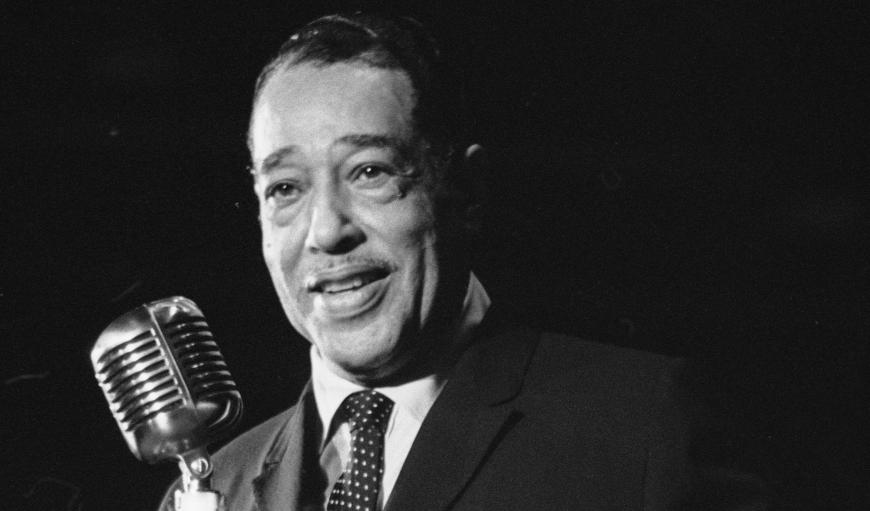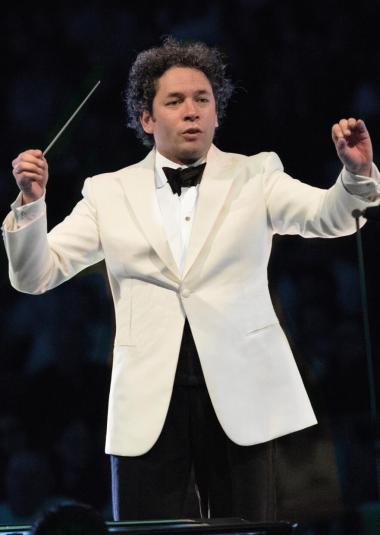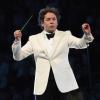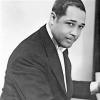
As that Duke Ellington standard so succinctly observes, in performing jazz, “it don’t mean a thing if it ain’t got that swing.” To accomplish this on a symphonic scale, however, requires a conductor who trusts his musicians enough to know when to take his hands off the wheel and leave the driving — or swinging — to them.
Relinquishing control, however, is not Gustavo Dudamel’s long suit, as he showed to ill effect during last Thursday’s Hollywood Bowl program featuring orchestral pieces by Duke Ellington and George Gershwin, supplemented with a song sampler performed by Broadway and television star Patina Miller.
Dudamel tends to double down on speed, using his baton more like a riding crop than a guidepost, as was readily apparent in the opening movement of Ellington’s final composition, Three Black Kings. Conceived as an homage to Martin Luther King Jr., it was unfinished at the time of the jazz king’s death in 1974. The task of finishing the piece fell to Ellington’s son, Mercer. Luther Henderson created the arrangement, and the work was premiered in 1976, with choreography by Alvin Ailey, who later introduced it into his company’s repertory.

The first movement, “King of the Magi,” opens with an atmospheric pulsing phrase in the marimba, accented by a resonant echo in the bass against a gentle rhythm from the congas. From there the tempo accelerates rapidly — in Dudamel’s case, like a runaway train. The tempos were so rapid and frenetic that the instrumental lines, especially in the strings, not only didn’t swing but tripped all over one another.
After a much-needed pause, the mood of the second movement, “King Solomon,” turned things indigo, with moonbeams cast from a solo clarinet. The scale here varies between intimate and cinematic as the strings swell to CinemaScope proportions. The final movement, “Martin Luther King,” evokes elements of gospel melodies with an ominous sense of dread.
In 2019, Patina Miller gave a dynamic performance as the Witch in the Bowl staging of Stephen Sondheim’s Into the Woods. She reprised the role in the recent highly acclaimed Encores! revival on Broadway, which earned a Grammy Award for its cast recording.
The focus of Thursday’s concert implied that Miller’s part of the show would focus on songs by Ellington and Gershwin. And the opening number, “I Got Rhythm,” did follow the theme.
Dressed in a flaming red gown, with her hair a cascade of black curls, Miller gave a rendition that included some Ella Fitzgerald-style scatting, but all was not well. During the next song, Harold Arlen and Ted Koehler’s 1933 standard “Stormy Weather,” the rapport with Dudamel, and his rapport with the musicians, turned uncertain.
The frayed communication, the tempos, and the overwrought (uncredited) arrangements took their toll. Soloists seemed uncertain how much freedom they had. It was cluttered. The exception was a star-worthy rendition of “Someone to Watch Over Me.”
After intermission, things improved considerably. Dudamel led a much more cohesive, headin’-uptown performance of Ellington’s three-movement jazz concerto Night Creature, which showcases the flavors of a jazz band within the overall orchestral framework. It’s not surprising that Alvin Ailey also embraced this work for its dance rhythms and bluesy atmosphere.
Night Creature is a work that the LA Phil and Dudamel have performed several times before, and cool replaced clutter, as led by the high-low piano tickling of the remarkably versatile Joanne Pearce Martin, the walking bass of Christopher Hanulik, and the sultry trumpet solos of Thomas Hooten. Were the Duke present, he would have applauded the entire brass section for standout ensemble playing.
It’s not a criticism to say that the LA Phil and Dudamel could play Gershwin’s An American in Paris in their sleep. Comfort is a good thing, and suddenly back in perfect sync, the orchestra’s performance was abundantly tuneful and clockwork precise.




